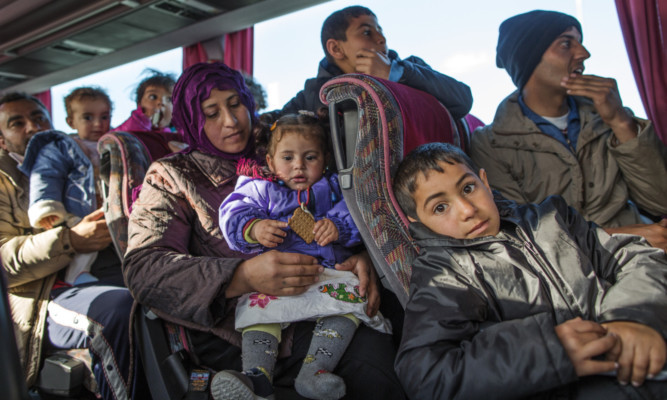A Fife volunteer who has travelled to the Greek islands to help Syrian and other Middle East refugees has accused European governments of “abandoning” Greece to contain and encamp people fleeing chaos and horrors.
Having seen the plight of refugees on the frontlines for himself, Chris Mitchell, of Kinghorn, is now urging people to write to their MPs and the press to demand the British Government shows “moral leadership” by allowing more refugees in.
It comes as aid agencies and charities say Europe’s “unconscionable” response to the refugee crisis is courting humanitarian disaster.
In an interview with The Courier from the Greek island of Kos, grand-father-of-two Chris, 63, said thousands had made the dangerous journey from Turkey to Greece by sea, and hundreds had died since he arrived there on February 21.
He said local island communities and their Solidarity groups such as those on Kos and Leros, are showing “super humanity” and had helped save many lives.
But he said they are being run on a “shoestring” and their efforts are being overwhelmed.
He said urgent donations were required to provide lifesaving equipment and care for the refugees.
He also challenged anyone with time to consider volunteering and to “support the humanity shown by the generous but hard pressed Greek island communites” by taking holidays there this year.
Giving a personal reflection, he said: “As I write this, 25 refugees have just landed on Kos after a long, cold night at sea.They were the last of over 200 who had arrived in that 24 hours. At 8am the morning before, I called my hotel to check out and go to nearby Leros. There I was told volunteers were much needed, refugee landings were in daily hundreds.
“At 8.15 our first call was to the port where 10 boys and men had been brought ashore by the Italian Coastguard boat. We distributed dry clothes, shoes, food and water at the camp.
“In the next 24 hours, three more boats and some 200 refugees would arrive: mothers with babies, young children, pregnant women, people on crutches and wheel chairs, old men from the east.
“From the last grey beached whale of a boat at dawn, one father carried ashore a child in a blanket. Eyes closed. Cold clawed hands. No pulse to be found. No response. Then a rasping breath to my ear. Dad pointed to his own head. The boy, who he could have held in his arms since Syria or beyond, was, he reassured me, profoundly disabled. I hoped so. We called for a doctor. Another economic migrant?”
Chris, who has volunteered for many years with the Kinghorn RNLI and Coastguard, said this not just a crisis for the refugees but a threat to the continuation of the European Union. He added: “It’s at least a threat to the EU as a union for a more humane and civilised Europe, one that has supposed to have learned the lessons of history.”
According to the UN Refugee Agency, 1,015,078 men, women and children, mostly from war-torn Syria, but also from other Asian and African countries, made the sea crossing into Europe during 2015.
In 2016 so far, 123,246 have made the crossing with 410 fatalities so far that’s 30 times more than the same period last year.
With the EU entering what many see as a make-or-break phase in tackling the crisis, the bloc’s most senior leaders this week called for urgent action to support Greece as at least 8,500 refugees and migrants remained trapped without permanent shelter on the country’s closed northern border with Macedonia.
Frontex, the EU’s border control agency, said 30 times as many migrants entered Europe in January and February as in the same two months of last year, and the UN’s refugee agency announced that 131,724 people had crossed the Mediterranean the vast majority of them reaching Greece so far in 2016, almost as many as made the journey in the first six months of 2015.
The UNHCR said the continent stood “on the cusp of a largely self-induced humanitarian crisis”, with governments “not working together despite agreements and country after country imposing new border restrictions”.
